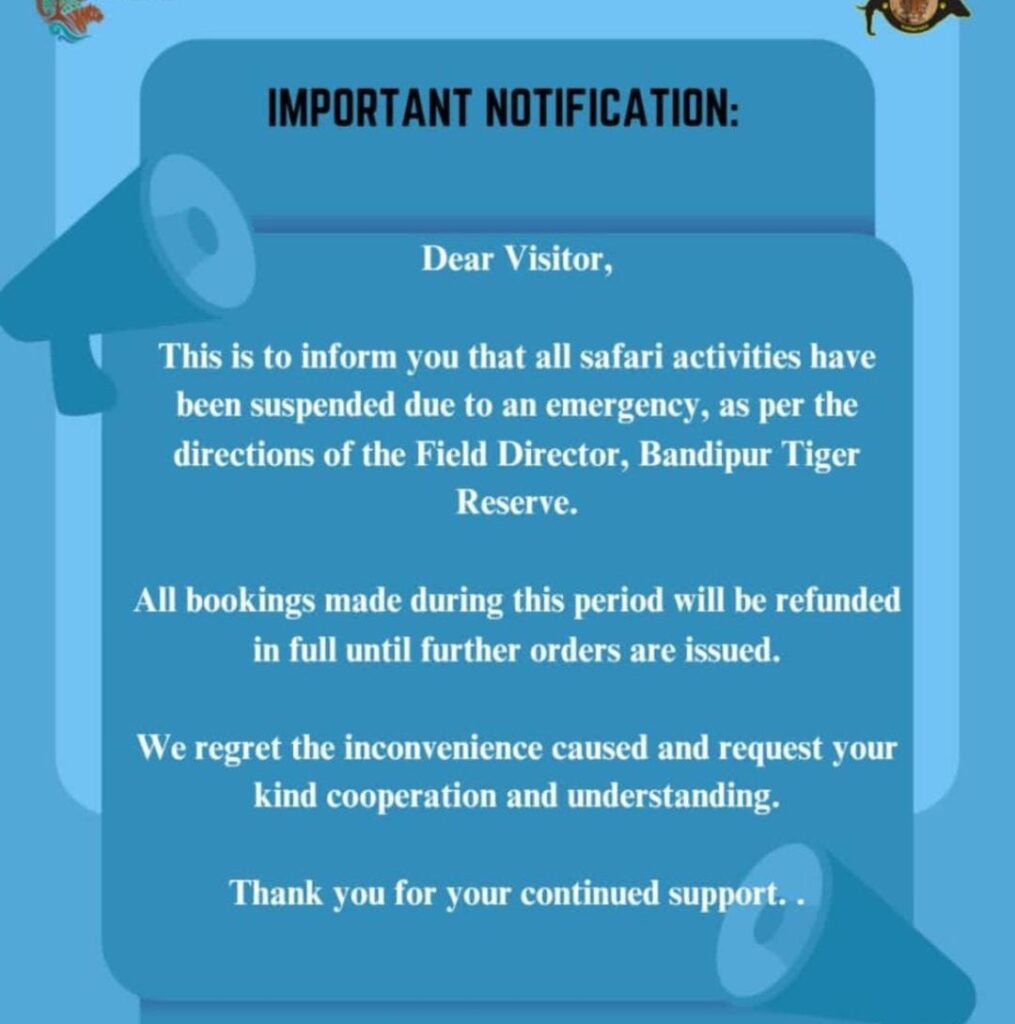
R S Tejus:
Another farmer died in a tiger attack this morning (7th November) in the Bandipur Tiger Reserve, Karnataka, India. A man who was tending his field with cattle was attacked and killed in the Moleyuru Range, Hediyala sub-Division, Bandipur Tiger Reserve.
This is the third death within a month in the same landscape.
The reason for this attack is still not known. But even before any clarity could emerge, Forest, Ecology & Environment Minister hurriedly announced a ban on safaris in Bandipur and Nagarhole until further notice and also banned trekking in conflict areas of the state. This may look like fast action, but in reality it is a misguided, unscientific, and senseless decision.

The geography makes the decision even more absurd. The attacks happened in the Hediyala Sub-Division while Safaris operate in the Bandipur Sub-Division.
These areas do not overlap in any way. Linking the two is like saying, “If you switch on the light in your bedroom, the bathroom light should also come on.” There is no connection. Yet a decision has been taken as if the two incidents are directly related. This is not leadership — this is confusion acting as policy.
DECISION MAKING AT ITS WORST
What this truly reveals is a government that is only trying to look busy, not trying to understand what is going wrong. It is far easier to shut down safaris than to ask why tigers are reaching farmlands, what is happening inside the forest, or how much stress the habitat is under. Such knee-jerk reactions show weakness, not strength. They expose a decision-making system that bends to pressure instead of standing on science, and they push the entire conservation framework towards collapse.
The deeper reality is that the forest habitat has been weakening for years. Karnataka’s forests have shrunk and become fragmented due to ill-planned development works, encroachments, road expansions, power lines, railway lines, and a variety of activities that eat into the landscape piece by piece. When forest edges become thin and fragile, wildlife is forced to move along these edges, making both animals and people vulnerable. This is where conflict is born — not inside the regulated safari routes.
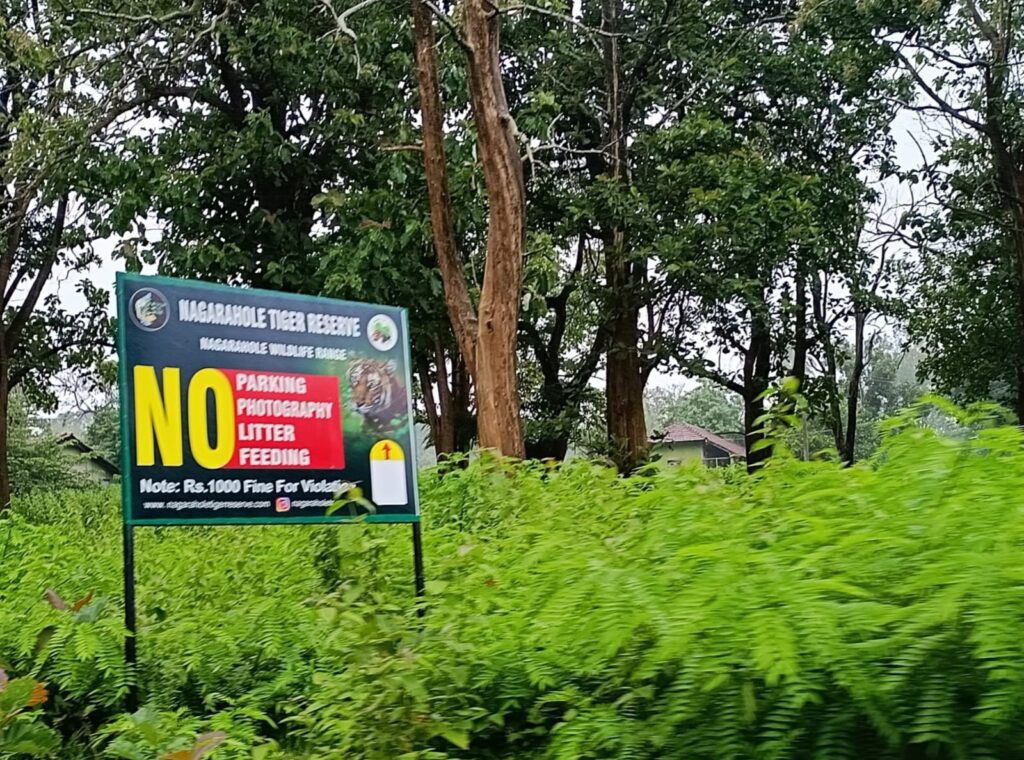
SHRINKING FOREST HABITAT
Every successive government, whether at the Centre or the State, has been obsessed with showing “good tiger numbers” while doing little to protect the land that these animals depend on. They proudly announce rising tiger populations but never address the shrinking habitats that are supposed to support those populations. What sense does it make to celebrate numbers when the foundation is crumbling?
This obsession has pushed the system towards unscientific steps — rushed lantana removal that allows the weed to grow back thicker, waterholes dug everywhere without study, taking unnecessary custody of tiger cubs, and treating naturally injured animals that should be allowed to die. All this disturbs natural systems and creates a chain of problems that eventually reach human settlements.
And in the middle of this, we always see the same magical solution: “plant more trees.” This has become the escape button for every environmental issue. But tree planting does not rebuild a forest. It does not repair a fragmented ecosystem. It does not bring back lost habitat. It only gives the illusion of action while the real problem remains untouched.
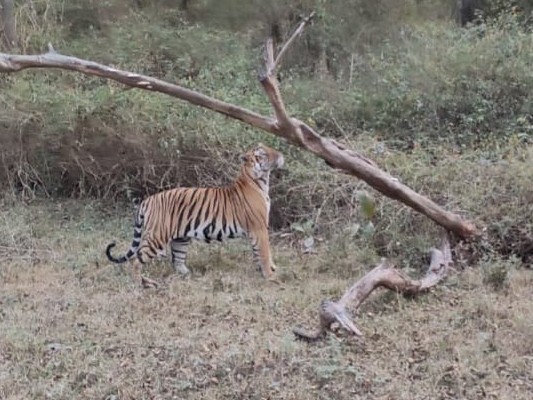
REDUCTION IN APC STAFF!
What has made this situation far more dangerous is the kind of advice the government has chosen to listen to. In a recent meeting, a set of inexperienced and uninformed individuals casually recommended reducing staff in Anti-Poaching Camps and even hinted at banning safaris completely. These ideas are not just wrong — they are reckless.
APC staff protect the forest from fires, poaching, and illegal activity. Removing them is like removing guards from a bank and hoping robberies will stop. And banning safaris entirely would destroy local livelihoods, cut revenue, and sever the public’s connection to forests.
The most alarming part is not that such foolish suggestions were given, but that the government actually entertained them. This is a clear sign of collapsing judgement and weak leadership.
Meanwhile, the biggest disturbance to wildlife happens every single day on forest highways. Vehicles fly through the reserve. People get down, scream, take selfies, block animals, and chase elephants like hooligans. This harassment puts enormous stress on wildlife. Stressed animals move unpredictably and often enter human areas. Yet none of this is addressed.
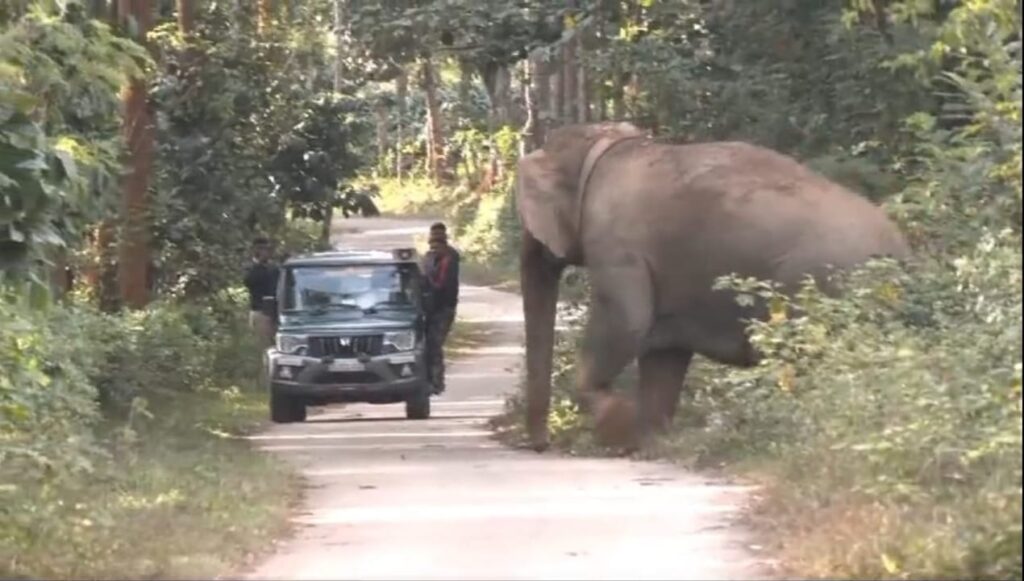
BASELESS AND MISGUIDED: KARNATAKA’S SAFARI BAN EXPOSES DEEP CONFUSION
The government chooses to attack safaris — the only regulated, controlled activity inside the forest. And Karnataka’s safari system is actually one of the best in India. Unlike the chaos in Bandhavgarh or Kanha, where fifty or more vehicles surround a single elephant or tiger for a photograph, Karnataka maintains strict limits, fixed routes, and disciplined operations. What works well here is being broken for no reason.
Inside the forest department, silence has begun to speak louder than words. Forest officers with decades of field experience seem to have no voice in crucial decisions anymore. Policies are being taken without their inputs, without ecological study, and without courage to face the truth. This is not conservation. This is failure being passed off as leadership.
Banning safaris until further notice will not stop tiger attacks. It will not reduce conflict. It will not protect villagers. All it will do is weaken public support, harm livelihoods, drain revenue, and expose how fragile and misguided our decision-making has become.
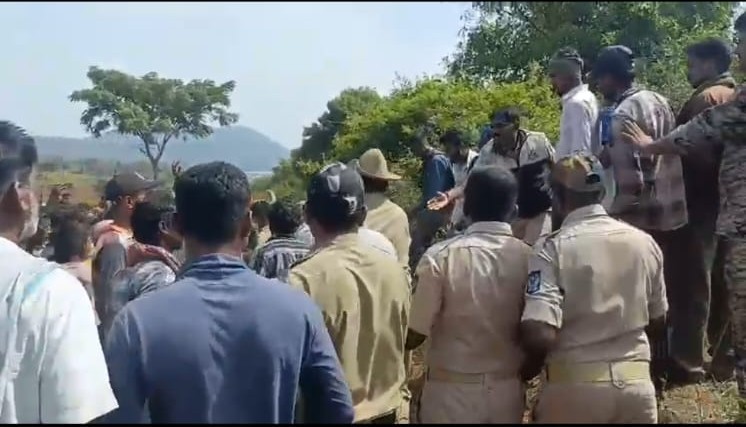
FIX THE REAL ISSUES
If Karnataka wants to reduce conflict, it must fix the real issues — shrinking forests, damaged habitats, invasive species, unscientific waterholes, edge vulnerability caused by reckless development, lack of relocation, weak APC strength, and the unchecked chaos on highways. Until these are addressed honestly, every new decision will drag us deeper into crisis.
One more issue that the government must stop delaying is the ex-gratia and compensation process. When a family loses a member to a wildlife attack, the payment should not take days or weeks. It should not require running from office to office or collecting endless documents. It should be swift, immediate, and delivered with dignity.
Delay in Compensation only adds more trauma to families already shattered by grief. A government that claims to care about conservation must also care about the people who live with wildlife every single day. Quick compensation is not a favour; it is a basic responsibility. If the administration can ban safaris within minutes, it should also be able to release compensation with the same urgency.
